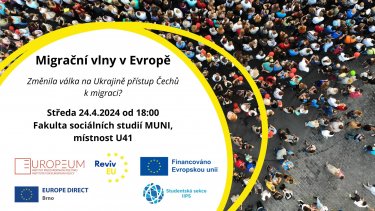TA3 | Results of the extraordinary summit in Brussels
At the extraordinary summit of European Council in Brussels, the original economic debates quickly turned to serious geopolitical issues, such as the extension of sanctions against Iran and the strengthening of Ukrainian air defenses. However, as pointed out by Vít Havelka for Slovakian TA3, an analyst at the EUROPEUM Institute, there is no fundamental shift in the EU's approach to countries such as Russia, Israel or Iran.
Show more
BLOG | The Use of Article 7 as a Protection Tool for the Rule of Law and European Values
With Hungary taking over the EU presidency in July 2024, many are questioning the EU's ability to promote its values in its member states. Indeed, the EU is about to hand over its presidency to a state that has been criticised for its actions that threaten the rule of law and is subject to the procedure set out in Article 7 of the Treaty on European Union (TEU), writes Maxime Painot in his blog.
Show moreRTVS | Extraordinary Summit in Brussels
The extraordinary summit in Brussels is focusing on competitiveness and the EU's strategic agenda, including the strengthening of the single market, Turkey-EU relations, Ukraine and Israel. Žiga Faktor, head of the Brussels office and deputy director of EUROPEUM Institute, commented on this for Slovak RTVS.
Show more
MF DNES | Pellegrini's first foreign trip will take him to the Czech Republic
The newly elected Slovak President Peter Pellegrini will follow a long-standing tradition and his first foreign trip will be to the Czech Republic. This is despite the cooling of diplomatic relations between the countries. According to Kristína Chlebáková, project manager of EUROPEUM Institute, the relations are still highly superior and the new Slovak president will not want to disturb them. She commented on the future of Czech-Slovak diplomatic relations for the daily MF DNES.
Show moreRadio Impuls | European Parliament's Inefficient Moving Between Two Locations
European Parliament's moving from Brussels to plenary sessions in Strasbourg carry symbolic significance, but the logistics costs up to 3 billion CZK annually. Implementing a change would require amending the fundamental treaties of the European Union, which would need approval from all member states. Viktor Daněk, Deputy Director of the EUROPEUM Institute, commented on this topic for Radio Impuls.
Show moreRevivEU | Has the war in Ukraine changed the Czech approach to migration?
We would like to invite you to a debate focusing on the discussion about changes in the Czech approach to refugees as a result of the Russian war in Ukraine. The event will take place on April 24, 2024, at 18:00 in Brno at the Faculty of Social Studies, Masaryk University, in room U41 (4th floor).
Show more20 Years of Reuniting Europe’s East and West: Is the EU Ready for Another “Big Bang” Enlargement?
We would like to invite you to a debate on a topic "20 Years of Reuniting Europe’s East and West: Is the EU Ready for Another “Big Bang” Enlargement?" The debate will take place on Thursday, April 4, from 16:00 to 17:15 h at Prague University of Economics and Business.
Show moreDebate: 25 years in NATO - What benefits has membership brought for Czechia?
We invite you to a regional debate marking the 25th anniversary of the Czech Republic's accession to NATO, which will take place on Wednesday, April 3rd, at 5:00 PM in the AKORD Cultural House located at SNP Square 1, 700 30 Ostrava-Zábřeh.
Show more
Newsroom ČT24 | Myths about the EU: Crooked bananas and other bans
Myths and disinformation about allegedly bad European officials and their bans spread in the Czech Republic even before joining the EU and persist to this day. What is the origin of these disinformation, and what are the most common myths? Žiga Faktor, head of the Brussels office and deputy director of the EUROPEUM Institute, addressed these questions in a comment for Newsroom ČT24.
Show more
RILSA | The uncertain fate of the Green Deal for Europe ahead of the European Parliament elections
Farmers' protests have reminded that the measures of the Green Deal for Europe may not be politically viable for Europeans. To make climate policies politically viable, the EU should therefore focus on its commitment not to leave anyone behind in the green transition. Klára Votavová, a researcher at EUROPEUM Institute for European Policy, discusses the current development of the Green Deal for Europe and its social policy aspects in an expert publication for the Social Policy Forum.
Show moreStaroměstské náměstí 4/1
Prague 1 - Staré Město
110 00
tel.: +420 212 246 552
email: europeum@europeum.org
https://www.europeum.org









